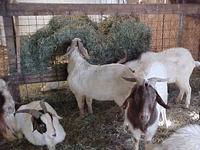With an estimated value of $105 million, New Jersey's livestock and poultry sector is a significant contributor to the state's agricultural industry. But challenges including rising feed and production costs, drought conditions and a limited distribution infrastructure in New Jersey are leading to fewer and fewer producers.
There are only three sale venues in New Jersey - Cowtown, Hackettstown and Tabernacle. These venues are only modestly attractive physically and offer some of the lowest prices in the region for livestock. The majority of New Jersey's livestock producers sell their animals out-of-state where they can make more money on their product.
Moreover, as trends in diets change and the state's ethnic community grows, so does the demand for livestock products such as goat meat. New Jersey's goat population, however, is not genetically suited for meat goat breeding and therefore cannot supply the local demand. To establish meat goat breeding in New Jersey, a specific breeding stock would need to be introduced.
A healthy industry is also largely dependent upon healthy animals.
The New Jersey Department of Agriculture currently administers numerous disease control programs to ensure the health of livestock and poultry throughout the state. The Department is active in avian influenza surveillance and eradication, periodically testing the live poultry markets and conducting educational inspections to ensure the owners are limiting the risk of avian influenza in the markets.
The Department's efforts to assist the industry also include the support of youth programs, such as the Junior Breeder loan program that makes low-interest loans to students who want to raise an animal as a project.
In keeping with the goals outlined in its strategic plan, the Department continues to identify strategies to ensure the economic viability of the state's livestock and poultry industry as well the agricultural industry as a whole.
STRATEGIES
- Ensure Animal Health
- Continue working to protect the health of the livestock and poultry industry from the immediate threat of devastating and economically damaging diseases.
- Continue working to protect the health of the livestock and poultry industry from the immediate threat of devastating and economically damaging diseases.
- Enhance Marketing Efforts
- Work to establish a Jersey Fresh brand name for livestock raised in the state, enabling the industry to benefit from a common trademark that identifies their products as locally produced.
- Assist in the exploration and development of international markets for the processed egg industry.
- Work to establish a Jersey Fresh brand name for livestock raised in the state, enabling the industry to benefit from a common trademark that identifies their products as locally produced.
- Encourage Production of Goat Products
- Use a Federal-State Marketing Improvement Program (FSMIP) grant to study the economics of breeding and marketing meat goats.
- Support goat farmers in Sussex County as they work to establish a meat goat association.
- Help increase consumer awareness about goat-related products, including milk and cheese and their nutritional benefits.
- Assist farmers with identifying markets for their products.
- Use a Federal-State Marketing Improvement Program (FSMIP) grant to study the economics of breeding and marketing meat goats.
- Encourage Production of Grass-Fed Animals - Beef, Sheep, Meat Goats
- Aid in the development of a market for grass-fed animals.
- Apply for a second FSMIP grant to help develop marketing programs for the distribution of fresh and frozen grass-fed products throughout the state.
- Support efforts toward offering grass-fed New Jersey meat products to farm markets throughout the northwestern part of the state.
- Consider conducting an economic impact study to determine the benefits of offering fresh products to farmers markets in Sussex and Warren counties this summer and statewide by summer 2005.
- Aid in the development of a market for grass-fed animals.
- Explore Benefits of Sheep Milk Production
- Introduce sheep milk production to 4-H students during the New Jersey Breeders Symposium.
- Consider undertaking a study to help quantify the demand for sheep milk and define its primary channels of distribution.
- Introduce sheep milk production to 4-H students during the New Jersey Breeders Symposium.
- Work With Markets
- Encourage the state's three markets to upgrade their facilities and adapt their operations to better meet the particular needs of both traditional and ethnic markets.
- Encourage the state's three markets to upgrade their facilities and adapt their operations to better meet the particular needs of both traditional and ethnic markets.
- Promote an Annual Market for Sheep, Goats
- Consider establishing a seasonal market for live sheep and goats at the Sussex County fairgrounds.
-
Assist in Addressing Labor Issues
- Continue the commitment to programs that support worker training, keep workers healthy and safe, and address issues such as farm labor housing.
- Support reform of policies and procedures addressing temporary agricultural worker visas at the federal and state level.
- Encourage farmers to take a pro-active approach to learning about their responsibilities at both the federal and state levels to ensure worker safety.
- Continue the commitment to programs that support worker training, keep workers healthy and safe, and address issues such as farm labor housing.



